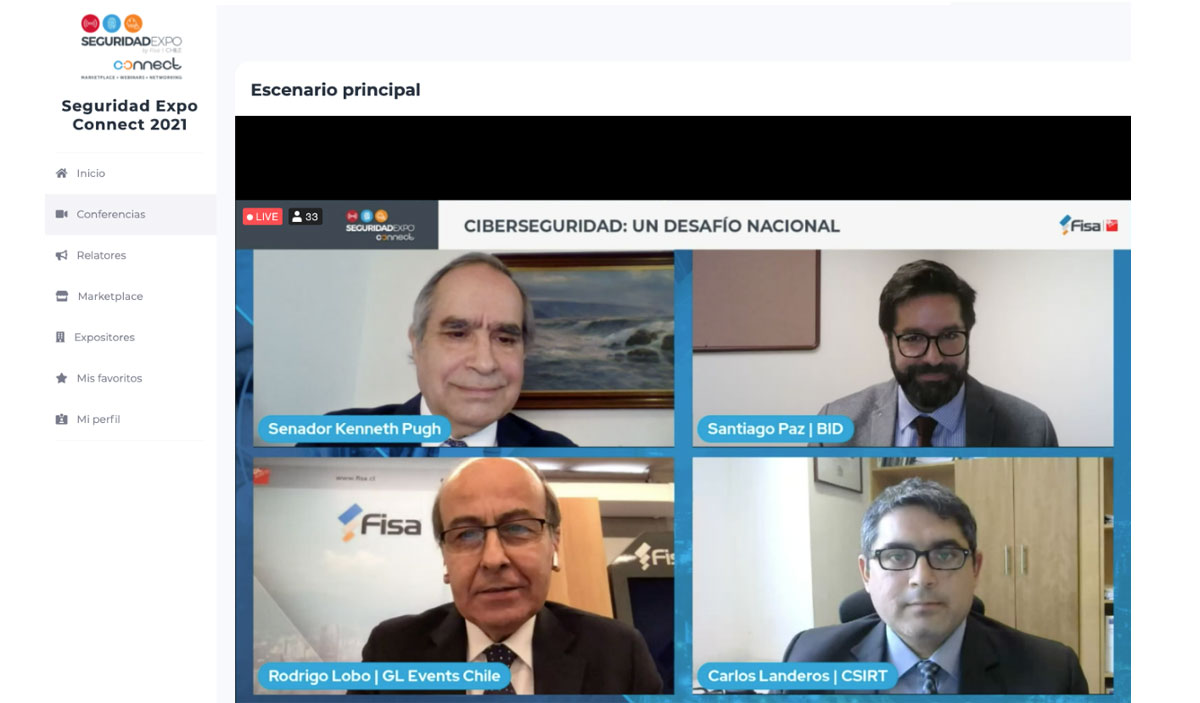
The seminar was led by Undersecretary of Telecommunications, Francisco Moreno and by Senator, Kenneth Pugh. On the occasion, the new digital platform, SeguridadExpo Connect, was also launched, which will allow the sector to remain connected. “As we know, when cyber risks appear across the board way in different areas, we confront a scenario prone for threats to spread quickly to different organizations”. With these words, the Undersecretary of Telecommunications, Francisco Moreno, inaugurated the seminar “Cybersecurity: a national challenge” organized by SeguridadExpo, as a prelude to the hybrid exhibition (face-to-face and virtual) to be held between October 26 and 28 of this year in Espacio Riesco in Santiago, Chile. In the seminar, Undersecretary Moreno Por, stressed that “it is vital that the public and private sectors and academia work together in the creation of standards and operate in an aligned manner in their implementation, thus strengthening the cybersecurity ecosystem.” At the event, Francisco Moreno explained that within the framework of the National Cybersecurity Policy, Subtel [Telecommunications Undersecretariat] has been entrusted with different responsibilities. “The Ministry of Transport and Telecommunications has fully complied with the three responsibilities established for the telecommunications sector: i.e., a proposal to regulate critical infrastructure, establishing security requirements for telecommunications operators, and conducting a study regarding the resilience of the telecommunications network.” And he added that as a result of the above “in 2020 the Subtel was one of the first government institutions to issue a technical standard (with the participation of the Ministry of Foreign Affairs, Ministry of Defense, Ministry of Interior, and Ministry of Transport and Telecommunications) which subsumes the general foundations of cybersecurity toward designing, deploying and operating networks and systems used in the provision of telecommunication services.” On that occasion, Senator Kenneth Pugh spoke about the challenges of Cybersecurity in our country stressing that “cybersecurity threats change from one year to the next, consequently, we have to make progress faster in promulgating a personal data protection law, following the European standard. Today in Chile we are still in the first legislative process in the Senate, but we hope to move forward soon. On the other hand, the new law on cybercrime, incorporated in the Budapest Convention that pursues transnational cybercrime, will be ready for promulgation soon”. Senator Pugh added that “it is not only that they attack us, but also that we have been unable to mitigate and build robust and resilient systems, which is what our National Cybersecurity Policy calls for. We must be able to understand this reality and face it as a country. That’s why the risk is high if we don’t do the right thing, but if we know how to manage the risk, we’re going to get the best benefit from cyberspace.” Finally, María Florencia Attademo-Hirt, the IDB representative in Chile, said that our country “is one of the 18 countries that appears for the first time at the top of cybersecurity rankings. At the IDB we believe that our key players in the region is important, not only because of our financial contributions, but also because of our technical assistance.” Panel Following the senator’s presentation, a panel was installed with the participation of Carlos Landeros, head of the Network and Computer Security Division of the Ministry of the Interior and Public Security, and Santiago Paz, an IDB cybersecurity specialist. Carlos Landeros said that “in the months that remain we are working on covering as much as possible of our Cybersecurity agenda. We hope that the Senate will stride forward on the cybercrime bill, which would be a good sign. Also, we hope that progress will be made on the Personal Data Protection project. We also expect to dispatch the Agency Project. Likewise, we continue to work on awareness raising topics with companies concerning cybersecurity risks, using the US$27 million lent by the IDB and earmarked for our cybersecurity training programs.” On the other hand, Santiago Paz stressed that “today we face a region that, although it has not regressed from 2016 to 2020, it has remained stable while making progress; however, that progress is not enough since threats continue to grow. I think that, given our lack of trained professionals to export services toward the development of companies, we are confronted with significant challenges as well as opportunities ahead, both nationally and internationally”.


 Fortinet (NASDAQ: FTNT) At Expomin 2021
Fortinet (NASDAQ: FTNT) At Expomin 2021
 International Armored Grouo “IAG” world leader in the manufacture of armored vehicles present at security expo 2021
International Armored Grouo “IAG” world leader in the manufacture of armored vehicles present at security expo 2021
 SecurityExpo 2021 will address the challenges in cybersecurity left by the pandemic, crime, migration, border security and climate change
SecurityExpo 2021 will address the challenges in cybersecurity left by the pandemic, crime, migration, border security and climate change
